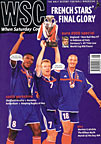 Ian Plenderleith investigates the best and worst websites offering 'sidesways glances' to the game
Ian Plenderleith investigates the best and worst websites offering 'sidesways glances' to the game
If you think Private Eye’s satire on the travails of Neasden FC and its two top fans Sid and Doris Bonkers ran out of steam around 20 years ago, then try the new, strictly non-profit, online fanzine All The Pies. It’s punchy, semi-anarchic, and has the potential, you feel, to get funnier.